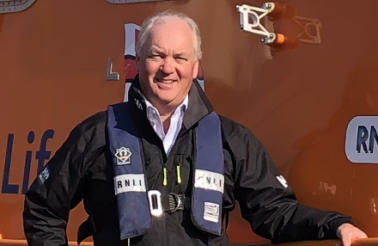The RNLI faces an “impossible situation” of figuring out how to safely reintroduce lifeguards while expecting a £45m drop in its income, its chief executive has warned.
There were concerns over the weekend about there being no lifeguards on beaches, despite easing of lockdown rules in England meaning many people travelled to the seaside.
In an open letter published yesterday, Mark Dowie, chief executive of RNLI, said the charity had been given little warning of the changes, and that before it can reintroduce lifeguards it needs to obtain enough personal protective equipment (PPE) and establish safe ways of working.
He urged the public to think before travelling to the beach.
The RNLI’s emergency lifeboat service has continued to operate and the charity said last weekend was the busiest of the year so far.
Dowie wrote: “Despite our warnings that there were no lifeguards on patrol this weekend, crowded beaches, hot weather and big waves meant our lifeboat crews had their busiest weekend so far this year. At least two people lost their lives.
“This puts the RNLI in an impossible situation. With thousands flocking to English beaches now lockdown restrictions have been eased, we must strike a balance that keeps the public and our lifeguards safe.”
‘Not a simple process’
Dowie said that the RNLI needs to obtain suitable PPE that will work in wet and sandy conditions, as well as train lifeguards to deliver first aid in a way that minimises the risk of spreading Covid-19.
He said: “Rolling out a lifeguard service – especially in a pandemic – is not as simple as putting a lifeguard on a beach. We found out about the easing of lockdown restrictions in England at the same time and in the same way as the general public. Contrast that with shops, which were given three weeks’ notice and even car showrooms have been given 7-days warning to prepare.
“We have to work out how to do in-water rescues and give first aid – normally conducted at close quarters and often with people coughing up water. We have to find PPE that will work on a beach and in the water – visors and aprons are no good on a rescue board. And we have to train our lifeguards in procedures to reduce the risk of infection.
“All this takes time and we learnt of the lifting of restrictions at the same time as everyone else.”
It is working on a plan with local authorities and beach owners to be able to provide a lifeguard service to around 30% of beaches that it usually covers.
Sustainability of the charity
Dowie also highlighted concerns about the charity’s own future sustainability.
Fundraising activity has been paused and charity shops are closed. The RNLI expects to see a £45m shortfall in income this year.
He said the charity needs £20m to fund a “normal lifeguard season”. Local authorities contribute 20% of this figure and the rest comes from donations.
“No-one is to blame for the situation we find ourselves in. We’re asking everyone to help manage an impossible situation, so please follow our safety advice and think before you head to the coast,” Dowie said.
In April the RNLI furloughed 30% of its staff and Dowie took a 50% pay cut as part of its efforts to manage during the crisis.
Related articles











